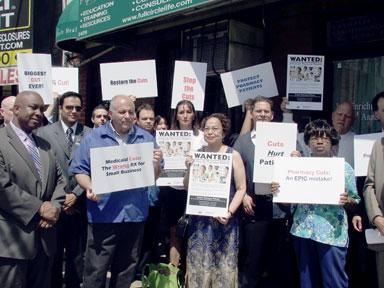In a press conference on Thursday, July 10, held outside of their center at 2429 E. Tremont Avenue, members of Full-Circle Health joined with the NYC Pharmacists Society and patients to protest an increased dispensing tax for name brand medications that small, independent pharmacists say could put them out of business.
The tax, which increased from 14% to 16 1/4% on July 1, may force the closure of independent pharmacies, which would then diminish access to much-needed drugs for the mentally ill and elderly.
“With one in four adults afflicted with some form of mental illness, ensuring affordable and convenient access to medications and treatment is crucial to New York’s approach to mental health,” said Derek Suite, president and CEO of Full Circle Health. “New York’s leaders are jeopardizing the state’s most vulnerable citizens by jeopardizing their access to quality healthcare services.”
The increase of the 2¼% dispensing tax represents a 70% decrease in net profits for pharmacies due to the decrease in reimbursement levels with the price of the drugs remaining the same at the wholesale level.
Independent pharmacists explain that their profit margins are already very small, and even a small increase in the tax could jeopardize their businesses, which serve a vital need in many communities, as the pharmacists often know their patients by their first names and are aware of any existing medical conditions.
“Providing care with dignity is at the heart of the services the community pharmacists provide,” said Jim Detura, chairman of the New York City Pharmacists Society and owner of Melrose Pharmacy on Cortlandt Avenue. “These multi-million dollar state Medicaid cuts are forcing pharmacies to reduce the amount of critical medications they carry, and in some cases, close their doors altogether.”
With access to professional services and critical medical treatments, most mentally ill patients can lead healthy, productive lives. While the mentally ill are an especially vulnerable population, the cuts will affect anyone who takes name-brand drugs.
“The state is jeopardizing the system because patients aren’t going to be able to get their medications,” said Rudy Dellorusso, a pharmacist from Pilgrim Pharmacy in Pelham Bay who was carrying a sign at the protest. “Albany is trying to balance budgets on the backs of patients who need their medications the most.”



















